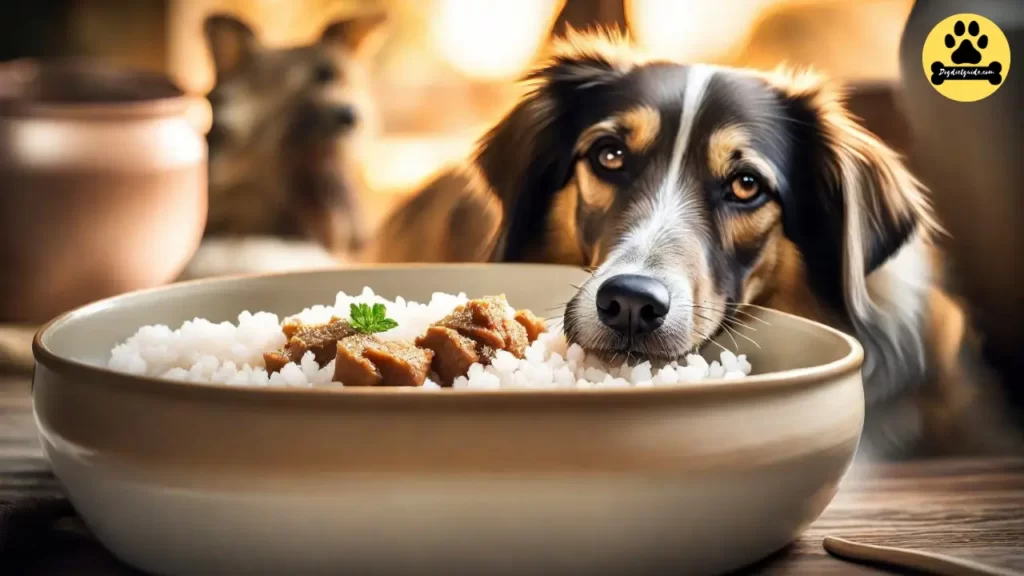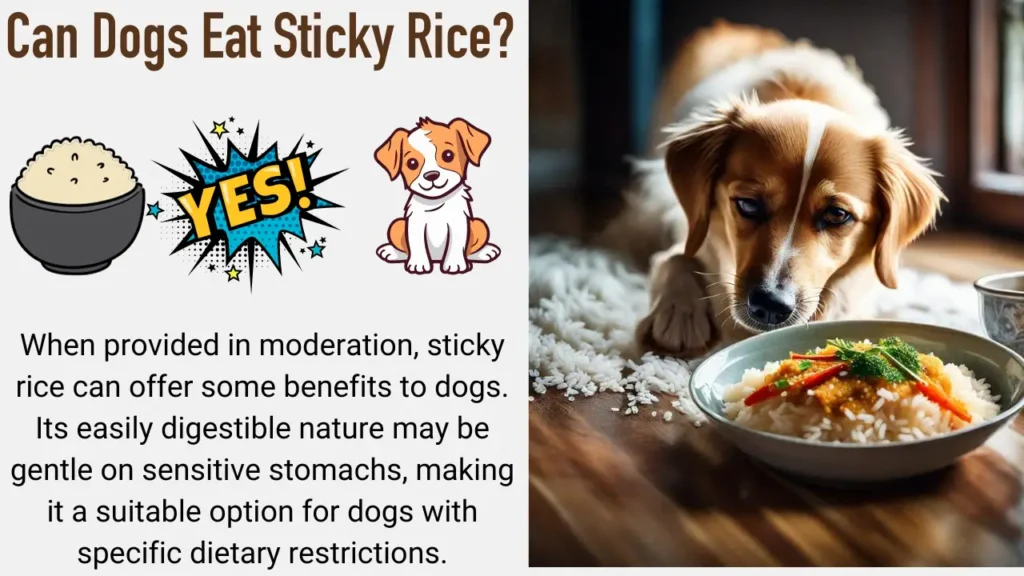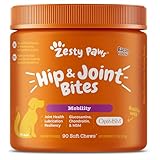Sticky rice, also known as glutinous rice, is a type of rice that is especially sticky when cooked. Recently, pet owners have become increasingly conscious of their furry friends’ dietary needs, leading to questions about including various human foods. One such query revolves around sticky rice and its suitability for canine consumption. So, can dogs eat sticky rice?
Sticky Rice For Dogs Overview
When provided in moderation, sticky rice can offer some benefits to dogs. Its easily digestible nature may be gentle on sensitive stomachs, making it a suitable option for dogs with specific dietary restrictions. However, dogs with allergies to or sensitivities to grains should avoid eating sticky rice.
Understanding Canine Dietary Needs
Before we explore the specific implications of sticky rice, it’s crucial to understand the dietary requirements of our canine companions.
Canines are omnivores, and while their primary diet should consist of high-quality commercial dog food, certain human foods can be incorporated safely in moderation.
Nutritional Composition of Sticky Rice
Sticky rice, a staple in many Asian cuisines, is a glutinous rice variety known for its unique texture and flavor. It contains essential nutrients like carbohydrates, proteins, and some vitamins. However, assessing how these components align with a dog’s nutritional needs is critical.
Can Dogs Eat Sticky Rice?
Yes. Plain, cooked sticky rice is safe for dogs to eat in moderation. However, ensure it is cooked thoroughly and free from additional ingredients that could harm dogs. It is a good practice to feed sticky rice as an occasional treat rather than a regular part of their diet.
Before making any significant changes to your dog’s diet, it’s advisable to consult with your veterinarian. They can provide personalized advice based on your dog’s breed, age, health status, and nutritional needs.

Sticky Rice Benefits For Dogs
-
Source of Carbohydrates: Sticky rice for dogs is a good carbohydrate source, an essential energy source for canines. Carbohydrates provide the energy needed for various bodily functions and activities.
-
Easy to Digest: Rice, including sticky white rice, is generally easy for dogs to digest. It can be a helpful option for puppies with sensitive stomachs or digestive issues.
-
Bland and Mild: Glutinous rice is light and flavorful, making it suitable for dogs with food sensitivities or allergies. It’s often recommended as part of a bland diet for dogs recovering from gastrointestinal upset.
-
Gluten-Free: While “glutinous rice” might suggest otherwise, sticky rice is gluten-free, which can benefit pups with gluten sensitivities or allergies.
-
Calming for Upset Stomachs: The bland nature of sticky rice for dogs can be soothing for canines with upset stomachs. It is commonly included in a bland diet prescribed by veterinarians for dogs recovering from gastrointestinal issues.
-
Weight Management: In moderate amounts, sticky white rice can be part of a well-balanced diet for furry friends. Controlling portion sizes and incorporating various foods helps manage a healthy weight.
Related Post: Can Dogs Eat Battered Fish?
Potential Risks and Considerations
Despite its potential benefits, introducing glutinous rice to your dog’s diet requires careful consideration. The high carbohydrate content may not be suitable for all pets, especially those prone to obesity or with certain health conditions.
Seasoning and additives in prepared sticky rice dishes can harm your dog’s health.
Safe Serving Ideas
When incorporating sticky rice into your pet’s diet, it’s essential to keep the servings plain and free from any additives that might be harmful to dogs.
-
Plain Sticky Rice: Cook the sticky rice thoroughly without adding salt, seasonings, or sauces. Serve it plain as a side dish in small, well-measured portions.
-
Mix with Lean Proteins: Combine plain, cooked glutinous rice with lean proteins such as boiled chicken or turkey. This can create a simple and balanced meal for your furry friend.
-
Vegetable Mix: Mix sticky rice with dog-friendly vegetables such as plain, cooked carrots or green beans. Vegetables can add fiber and additional nutrients to the meal.
-
Plain Congee: Congee is a type of rice porridge. Prepare a plain congee with sticky rice and water or low-sodium broth. Congee can be especially useful for puppies with upset stomachs.
-
Homemade Dog Treats: You can incorporate sticky rice into homemade dog treats. For example, you could make rice and meatballs by combining cooked glutinous rice with ground meat (such as chicken or turkey) and forming small, bite-sized balls.
-
Freeze for Chewable Treats: Freeze small portions of cooked sticky rice in ice cube trays. These frozen rice cubes can be an excellent and chewable treat for your dog, especially during hot weather.
Like any new addition to a dog’s diet, moderation is key. Small portions of plain, cooked sticky rice can occasionally be integrated into your dog’s meals. Observing your pup’s response is essential to ensure no adverse reactions or digestive issues.

Which Dogs Should Not Eat Sticky Rice?
-
Dogs with Grain Allergies: Some dogs may have allergies or sensitivities to grains, including rice. If your pooch has known grain allergies, it’s best to consult your veterinarian before introducing sticky rice into their diet.
-
Diabetic Dogs: If your dog has diabetes, it’s crucial to manage their carbohydrate intake carefully, and sticky rice may not be the best choice.
-
Dogs with Pancreatitis: Dogs with a history of pancreatitis may benefit from a low-fat diet. While sticky rice is low in fat, other ingredients that may be added to it could be problematic.
-
Individual Dietary Sensitivities: Dogs, like humans, can have particular sensitivities to certain foods. If you notice any adverse reactions such as upset stomach, diarrhea, or vomiting after feeding your dog sticky rice, it’s essential to discontinue and consult with your vet.
-
Overweight Dogs: While sticky rice in moderation can be part of a balanced diet, excessive amounts may contribute to weight gain. If your dog is overweight, managing portion sizes and overall caloric intake is crucial.
Related Post: Are Chicken Skin Dog Treats Safe?
Final Thoughts: Can Dogs Eat Sticky Rice?
In conclusion, whether dogs can eat sticky rice comes from moderation and individual health considerations. While sticky rice can offer some nutritional benefits, it should be treated as a supplement rather than a staple in a dog’s diet.










![Can Dogs Eat Blood? 7 Side Effects [Expert Opinion]](https://petskor.com/wp-content/uploads/2022/04/Webp.net-resizeimage-12.jpg)
